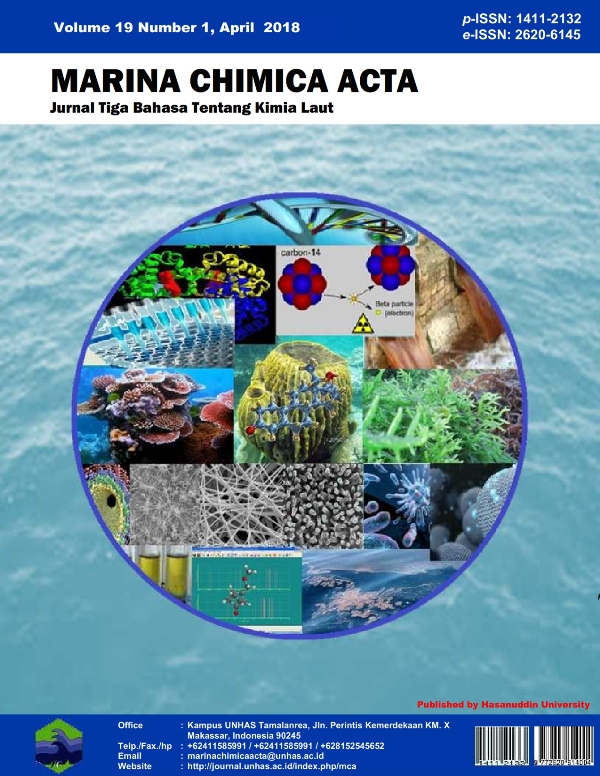PROFILE OF AMINO ACIDS OF FOREST HONEYS FROM MALLAWA SOUTH SULAWESI
DOI:
https://doi.org/10.20956/mca.v19i1.4210Abstract
Mallawa is one of the areas that has production forests as the second largest honey producer in Maros. The aim of this research determined the profile of amino acids in honey. Amino acids of two forest honeys were analyzed using ultra performance liquid chromatography (UPLC). The main amino acids detected honeys were glutamic acid (1060.66 mg/kg, 928.85 mg/kg), histidine (700.37 mg/kg, 478.02 mg/kg), and arginin (683.11 mg/kg, 665.08 mg/kg), but tyrosine and serine not detected. Some other amino acids, including threonine, leucine, valine, phenylalanine and proline, displayed similar values contents of 239.36 mg/kg, 268.15 mg/kg; 225.81 mg/kg, 293.44 mg/kg; 170.12 mg/kg, 226.03 mg/kg; 174.74 mg/kg, 288.11 mg/kg; and 161.58 mg/kg, 257.44 mg/kg, respectively.Downloads
References
Buba, F., Gidado, A., Shugaba, A., (2013). Analysis of Biochemical Composition of Honey Samples from North-East Nigeria, Research Article Open Access Biochemistry & Analytical Biochemistry, 2: 3. http://dx.doi.org/10.4172/2161-1009.1000139
Manyi-Loh C.E., Clarke, A.M., Ndip, R.L., (2011). An overview of honey: Therapeutic properties and contribution in nutrition and human health, African Journal of Microbiology Research 5 (8): 844-852.
Kivrak I., (2015). Free Amino Acid Profiles of 17 Turkish Unifloral Honeys. Journal of Liquid Chromatography and Related Technologies, 85: 855 – 862.
Qamer, S., Ehsan, M., Nadeem, S., Shakoori, A.R., (2007). Free Amino Acid Content of Pakistani Unifloral Honey Produced by Apis mellifera. Pakistan J. Zool 39(2): 99 – 102.
Hermosín, I., Chicón, R. M. & Cabezudo, M. D., (2003). Free amino acid composition and botanical origin of honey. Food Chemistry, 83, 263–268.
Badan Pusat Statistik and Bappeda Maros, (2013). Maros in Figures. Badan Pusat Statistik Kabupaten Maros. ISSN:0215-6709, 115.
Mujetahid,A., (2007), Teknik Pemanenan Madu Lebah Hutan oleh Masyarakat Sekitar Hutan di Kecamatan Mallawa Kabupaten Maros, J. Perennial, 4(1); 36-40.
Sukmawati, Noor, A., Firdaus., (2015), Analysis of Volatile Organic Compound of Mallawa Honey. Marina Chimica Acta, 17(2); 52-58.
Janiszewsk, K., Aniołowska, M., Nowakowski, P., Free Amino Acids Content from Poland. Polish Journal of Food and Nutrition Sciences, 62(2); 85-89

